标签:uid ring 划线 .text dso ras XA return ret

网页翻译的不是很准确,只能了解个大概,基本能获取如下信息:
对于用Maven构建的项目, pom.xml配置:
<dependency> <groupId>org.apache.solr</groupId> <artifactId>solr-solrj</artifactId> <version>7.1.0</version> </dependency>
如果不用maven构建项目,只需要将solr-solrj-7.1.0.jar 和 在dist/solrj-lib目录中的依赖包放入到工程中。
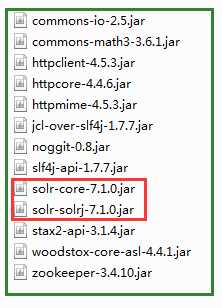
在solr5系之后跟solr4最大的区别是被发布成了一个独立的应用。而不再需要tomcat等容器。在其内部集成了jetty服务器,他可以通过bin目录的脚本直接运行启动。solr5有两种运行模式,独立模式和云模式,独立模式是以core来管理,云模式是以collection来管理。
SolrClient是一个抽象类,下边有很多被实现的子类,HttpSolrClient是通用客户端。 可以与一个Solr节点直接通信。),
LBHttpSolrClient,CloudSolrClient,ConcurrentUpdateSolrClient
HttpSolrClient的创建需要用户指定一个或多个Solr基础URL,然后客户端使用Solr发送HTTP请求。
一个URL的路径指向一个特定的核心或集合(例如, http://hostname:8983/solr/core1 )。当核心或集合中指定基础的URL,后续请求由客户机不需要测量影响集合。 然而,客户端是有限的核心/集合、发送请求,不能发送请求到任何其他实例。
一个URL指向根Solr路径(例如, http://hostname:8983/solr )。 当没有指定核心或集合的基URL,可以请求任何核心/收集,但受影响的核心/必须指定集合的所有请求。
一般来说,如果你的 SolrClient 只会被用在一个核心/收集,包括实体的路径是最方便的。 需要更多的灵活性,收集/核心应该被排除在外。
final String solrUrl = "http://127.0.0.1:8080/solr"; //创建solrClient同时指定超时时间,不指定走默认配置 HttpSolrClient build = new HttpSolrClient.Builder(solrUrl) .withConnectionTimeout(10000) .withSocketTimeout(60000) .build();
不同solr版本solrj 的创建方式有所不同
//solr4创建方式 //SolrServer solrServer = new HttpSolrServer("http://127.0.0.1:8080/solr"); //solr5创建方式,在url中指定core名称:core1 //HttpSolrClient solrServer=new HttpSolrClient("http://127.0.0.1:8080/solr/core1"); //solr7创建方式,在url中指定core名称:core1 HttpSolrClient solrServer= new HttpSolrClient.Builder("http://127.0.0.1:8080/solr/core1").build();
注意:solr5以后URL指向自定义核心的名称,如实例名称是core1,那么URL为http://127.0.0.1:8080/solr/core1
SolrClient有很多quary() 查询方法用于从solr中获取结果,这些方法都需要一个SolrParams 类型的参数,该对象可以封装任意的查询参数。和每个方法输出 QueryResponse 一个包装器,可以用来访问结果文档和其他相关的元数据。
/** * 查询 * @throws Exception */ @Test public void querySolr() throws Exception{ //[1]获取连接 // HttpSolrClient client= new HttpSolrClient.Builder("http://127.0.0.1:8080/solr/core1").build(); String solrUrl = "http://127.0.0.1:8080/solr/core1"; //创建solrClient同时指定超时时间,不指定走默认配置 HttpSolrClient client = new HttpSolrClient.Builder(solrUrl) .withConnectionTimeout(10000) .withSocketTimeout(60000) .build(); //[2]封装查询参数 Map<String, String> queryParamMap = new HashMap<String, String>(); queryParamMap.put("q", "*:*"); //[3]添加到SolrParams对象 MapSolrParams queryParams = new MapSolrParams(queryParamMap); //[4]执行查询返回QueryResponse QueryResponse response = client.query(queryParams); //[5]获取doc文档 SolrDocumentList documents = response.getResults(); //[6]内容遍历 for(SolrDocument doc : documents) { System.out.println("id:"+doc.get("id") +"\tproduct_name:"+doc.get("product_name") +"\tproduct_catalog_name:"+doc.get("product_catalog_name") +"\tproduct_number:"+doc.get("product_number") +"\tproduct_price:"+doc.get("product_price") +"\tproduct_picture:"+doc.get("product_picture")); } client.close(); }
SolrParams 有一个 SolrQuery 子类,它提供了一些方法极大地简化了查询操作。下面是 SolrQuery示例代码 :
/** * 2、使用 SolrParams 的子类 SolrQuery,它提供了一些方便的方法,极大地简化了查询操作。 * @throws Exception */ @Test public void querySolr2() throws Exception{ //[1]获取连接 // HttpSolrClient client= new HttpSolrClient.Builder("http://127.0.0.1:8080/solr/core1").build(); String solrUrl = "http://127.0.0.1:8080/solr/core1"; //创建solrClient同时指定超时时间,不指定走默认配置 HttpSolrClient client = new HttpSolrClient.Builder(solrUrl) .withConnectionTimeout(10000) .withSocketTimeout(60000) .build(); //[2]封装查询参数 SolrQuery query = new SolrQuery("*:*"); //[3]添加需要回显得内容 query.addField("id"); query.addField("product_name"); query.setRows(20);//设置每页显示多少条 //[4]执行查询返回QueryResponse QueryResponse response = client.query(query); //[5]获取doc文档 SolrDocumentList documents = response.getResults(); //[6]内容遍历 for(SolrDocument doc : documents) { System.out.println("id:"+doc.get("id") +"\tproduct_name:"+doc.get("product_name") +"\tname:"+doc.get("name") +"\tproduct_catalog_name:"+doc.get("product_catalog_name") +"\tproduct_number:"+doc.get("product_number") +"\tproduct_price:"+doc.get("product_price") +"\tproduct_picture:"+doc.get("product_picture")); } client.close(); }
添加索引使用SolrClient的add()方法
/** * 添加 * @throws SolrServerException * @throws IOException */ @Test public void solrAdd() throws Exception{ //[1]获取连接 // HttpSolrClient client= new HttpSolrClient.Builder("http://127.0.0.1:8080/solr/core1").build(); String solrUrl = "http://127.0.0.1:8080/solr/core1"; //创建solrClient同时指定超时时间,不指定走默认配置 HttpSolrClient client = new HttpSolrClient.Builder(solrUrl) .withConnectionTimeout(10000) .withSocketTimeout(60000) .build(); //[2]创建文档doc SolrInputDocument doc = new SolrInputDocument(); //[3]添加内容 String str = UUID.randomUUID().toString(); System.out.println(str); doc.addField("id", str); doc.addField("name", "Amazon Kindle Paperwhite"); //[4]添加到client UpdateResponse updateResponse = client.add(doc); System.out.println(updateResponse.getElapsedTime()); //[5] 索引文档必须commit client.commit(); }
在正常情况下,文档应该在更大的批次,索引,而不是一次一个的进行索引。 它也建议使用Solra Solr管理员提交文档??时设置为autocommit自动提交,而不是使用显式的 commit() 调用。
/** * 4、单个id 的删除索引 */ @Test public void solrDelete() throws Exception{ //[1]获取连接 HttpSolrClient client = Constant.getSolrClient(); //[2]通过id删除 client.deleteById("30000"); //[3]提交 client.commit(); //[4]关闭资源 client.close(); }
/** * 5、多个id 的list集合 删除索引 */ @Test public void solrDeleteList() throws Exception{ //[1]获取连接 HttpSolrClient client = Constant.getSolrClient(); //[2]通过id删除 ArrayList<String> ids = new ArrayList<String>(); ids.add("30000"); ids.add("1"); client.deleteById(ids); //[3]提交 client.commit(); //[4]关闭资源 client.close(); }
SolrJ提供两个有用的接口,UpdateResponse 和 QueryResponse,它们可以很方便的处理特定域的对象,可以使您的应用程序更容易被理解。SolrJ支持通过每个实例变量在Java对象可以映射到一个相应的Solr字段中,使用 @Field注解隐式转换文档与任何类。field注解。
先查看一下配置:
solrconfig.xml配置
<requestHandler name="/dataimport" class="solr.DataImportHandler"> <lst name="defaults"> <!--数据源配置文件所在路径--> <str name="config">./data-config.xml</str> </lst> </requestHandler>
data-config.xml配置
<?xml version="1.0" encoding="UTF-8" ?> <dataConfig> <dataSource type="JdbcDataSource" driver="com.mysql.jdbc.Driver" url="jdbc:mysql://localhost:3306/solrdata" user="root" password="root"/> <document> <entity name="product" query="select pid,name,catalog,catalog_name,price,number,description,picture from products"> <field column="pid" name="id"/> <field column="name" name="p_name"/> <field column="catalog_name" name="p_catalog_name"/> <field column="price" name="p_price"/> <field column="number" name="p_number"/> <field column="description" name="p_description"/> <field column="picture" name="p_picture"/> </entity> </document> </dataConfig>
managed-schema文件配置
<!--配置ik分词器--> <fieldType name="text_ik" class="solr.TextField"> <analyzer type="index" class="org.wltea.analyzer.lucene.IKAnalyzer"/> <analyzer type="query" class="org.wltea.analyzer.lucene.IKAnalyzer"/> </fieldType> <!--配置ik分词器--> <field name="name_ik" type="text_ik" indexed="true" stored="true"/> <!--项目中的字段--> <field name="p_name" type="text_ik" indexed="true" stored="true"/> <field name="p_catalog_name" type="string" indexed="true" stored="true"/> <field name="p_price" type="pfloat" indexed="true" stored="true"/> <field name="p_number" type="plong" indexed="true" stored="true"/> <field name="p_description" type="text_ik" indexed="true" stored="true"/> <field name="p_picture" type="string" indexed="false" stored="true"/> <!--关键词 定义复制域字段,将商品名称和商品描述都复制到 product_keywords这一个字段上--> <field name="p_keywords" type="text_ik" indexed="true" stored="false" multiValued="true" /> <copyField source="p_name" dest="p_keywords" /> <copyField source="p_description" dest="p_keywords" />
其中 indexed="true" 表示开启索引(当字段不需要被检索时,最好不要开启索引,) stored="true"表示存储原来数据(当字段不被检索,而只是需要通过其他字段检索而获得时,要设为true) multiValued="true" 表示返回多值,如一个返回多个content,此时要在java代码中把 content设置 集合或数组类型如
private String[] content;//多值,对应 multiValued="true"
注意:solr4版本的field的type属性的基本数据类型到solr7的变化
详细内容参照solr-7.1.0\example\example-DIH\solr\db\conf\目录下的managed-schema
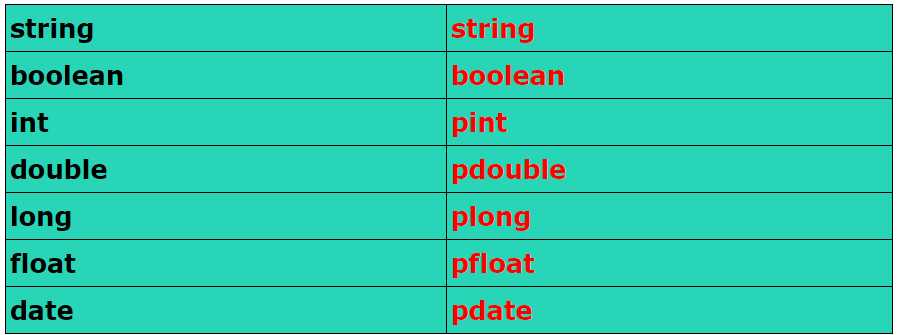
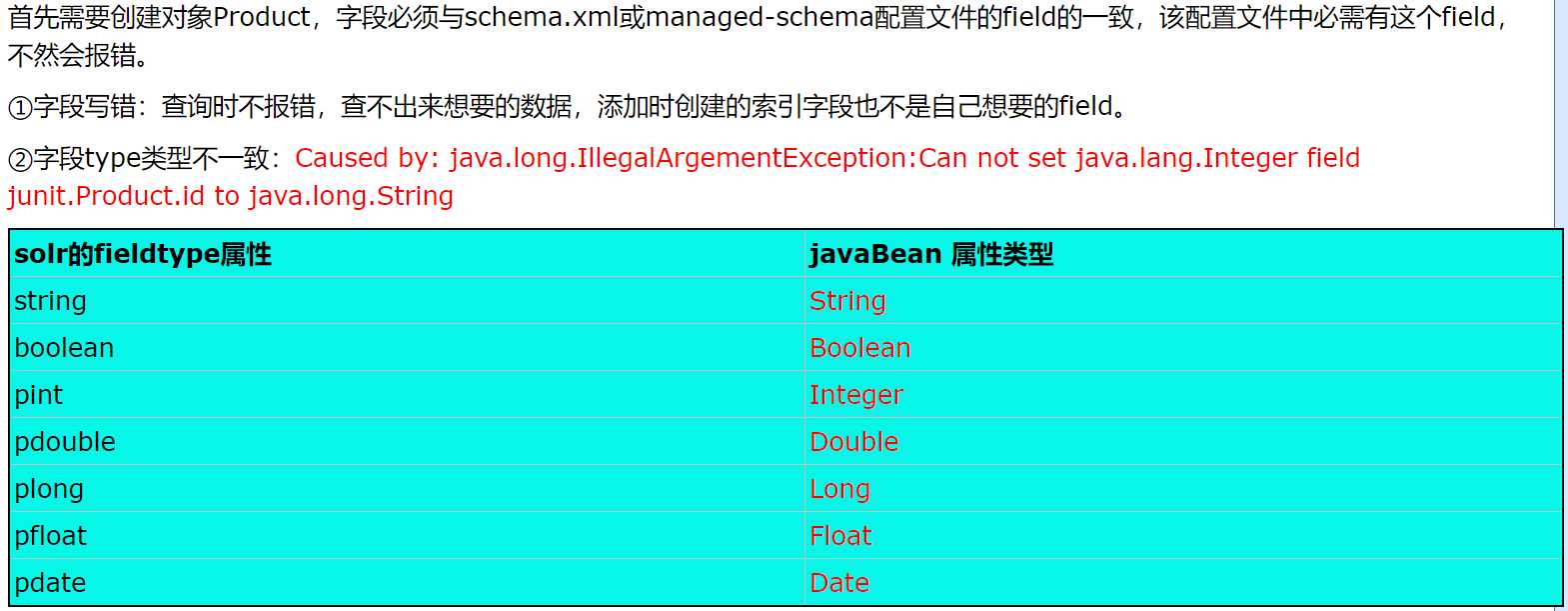
product实体对象:
package junit; import org.apache.solr.client.solrj.beans.Field; public class Product { /** * 商品编号 */ @Field private String id; /** * 商品名称 */ @Field private String p_name; /** * 商品分类名称 */ @Field private String p_catalog_name; /** * 价格 */ @Field private Float p_price; /** * 数量 */ @Field private Long p_number; /** * 图片名称 */ @Field private String p_picture; /** * 商品描述 */ @Field private String p_description; public String getId() { return id; } public void setId(String id) { this.id = id; } public String getP_name() { return p_name; } public void setP_name(String p_name) { this.p_name = p_name; } public String getP_catalog_name() { return p_catalog_name; } public void setP_catalog_name(String p_catalog_name) { this.p_catalog_name = p_catalog_name; } public Float getP_price() { return p_price; } public void setP_price(Float p_price) { this.p_price = p_price; } public Long getP_number() { return p_number; } public void setP_number(Long p_number) { this.p_number = p_number; } public String getP_picture() { return p_picture; } public void setP_picture(String p_picture) { this.p_picture = p_picture; } public String getP_description() { return p_description; } public void setP_description(String p_description) { this.p_description = p_description; } //空参数构造 public Product() {} //满参数构造 public Product(String id, String p_name, String p_catalog_name, Float p_price, Long p_number, String p_picture, String p_description) { super(); this.id = id; this.p_name = p_name; this.p_catalog_name = p_catalog_name; this.p_price = p_price; this.p_number = p_number; this.p_picture = p_picture; this.p_description = p_description; } }
/** * 6、Java对象绑定,通过对象创建索引 */ @Test public void addBean() throws Exception{ //[1]获取连接 // HttpSolrClient client= new HttpSolrClient.Builder("http://127.0.0.1:8080/solr/core1").build(); String solrUrl = "http://127.0.0.1:8080/solr/core1"; //创建solrClient同时指定超时时间,不指定走默认配置 HttpSolrClient client = new HttpSolrClient.Builder(solrUrl) .withConnectionTimeout(10000) .withSocketTimeout(60000) .build(); //[3]创建对象 Product product = new Product(); product.setId("30000"); product.setP_name("测试商品名称"); product.setP_catalog_name("测试商品分类名称"); product.setP_price(399F); product.setP_number(30000L); product.setP_description("测试商品描述"); product.setP_picture("测试商品图片.jpg"); //[4]添加对象 UpdateResponse response = client.addBean(product); //[5]提交操作 client.commit(); //[6]关闭资源 client.close(); }
查看添加的内容如下:
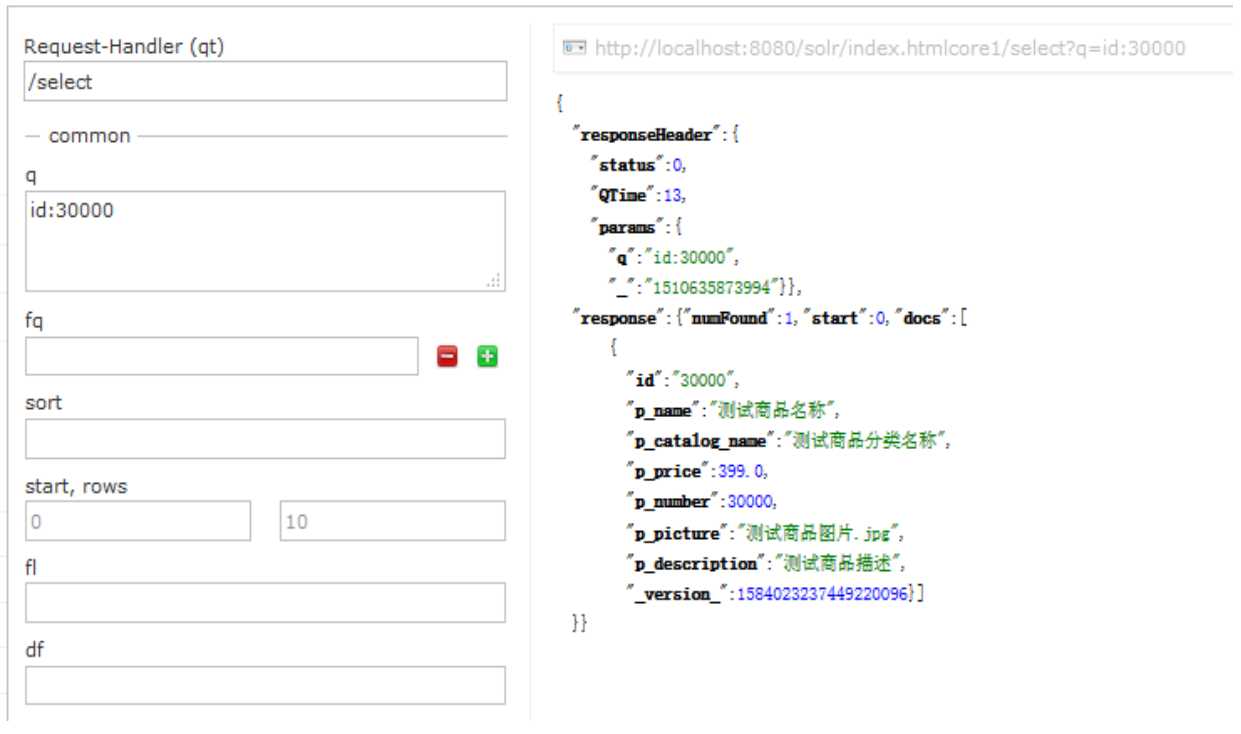
搜索时可以通过QueryResponse的直接转换成bean对象:getbean()方法将结果
/** * 7、Java对象绑定,通过对象查询索引 */ @Test public void queryBean() throws Exception{ //[1]获取连接 // HttpSolrClient client= new HttpSolrClient.Builder("http://127.0.0.1:8080/solr/core1").build(); String solrUrl = "http://127.0.0.1:8080/solr/core1"; //创建solrClient同时指定超时时间,不指定走默认配置 HttpSolrClient client = new HttpSolrClient.Builder(solrUrl) .withConnectionTimeout(10000) .withSocketTimeout(60000) .build(); //[2]创建SolrQuery对象 SolrQuery query = new SolrQuery("*:*"); //添加回显的内容 query.addField("id"); query.addField("p_name"); query.addField("p_price"); query.addField("p_catalog_name"); query.addField("p_number"); query.addField("p_picture"); query.setRows(200);//设置每页显示多少条 //[3]执行查询返回QueryResponse QueryResponse response = client.query(query); //[4]获取doc文档 List<Product> products = response.getBeans(Product.class); //[5]遍历 for (Product product : products) { System.out.println("id:"+product.getId() +"\tp_name:"+product.getP_name() +"\tp_price:"+product.getP_price() +"\tp_catalog_name:"+product.getP_catalog_name() +"\tp_number:"+product.getP_number() +"\tp_picture:"+product.getP_picture() ); } //[6]关闭资源 client.close(); }
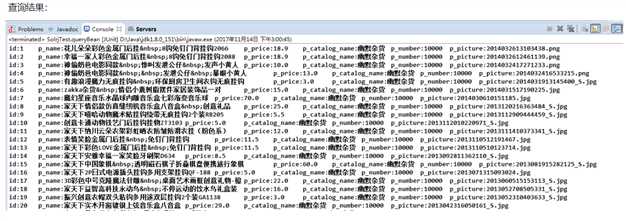
/** * 8、通过deleteByQuery删除索引 */ @Test public void deleteBean() throws Exception{ //[1]获取连接 // HttpSolrClient client= new HttpSolrClient.Builder("http://127.0.0.1:8080/solr/core1").build(); String solrUrl = "http://127.0.0.1:8080/solr/core1"; //创建solrClient同时指定超时时间,不指定走默认配置 HttpSolrClient client = new HttpSolrClient.Builder(solrUrl) .withConnectionTimeout(10000) .withSocketTimeout(60000) .build(); //[2]执行删除 client.deleteByQuery("id:100"); //[3]提交操作 client.commit(); //[4]关闭资源 client.close(); }
下面是官网API的对字段类型定义的说法
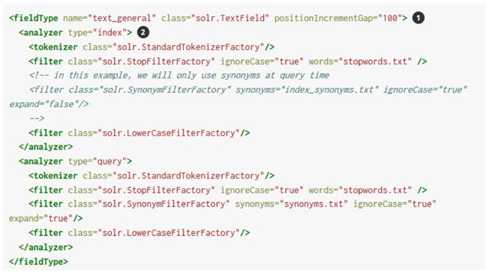
① 上面的示例中的第一行包含字段类型名称 name="text_general",实现类的名称class="solr.TextField"
② 其余的定义是关于对field分析、描述 理解分析、分词器和过滤器 。
实现类负责确保字段是正确的被处理。 在managed-schema中的类名,字符串 solr 是 org.apache.solr.schema 或org.apache.solr.analysis的缩写。如: solr.TextField 真的是 org.apache.solr.schema.TextField 。
field type的class属性决定了大多数字段类型的行为,但可选属性也可以被定义。例如,下面的日期字段类型定义两个属性的定义,sortMissingLast和omitNorms 。
<fieldType name="date" class="solr.DatePointField" sortMissingLast="true" omitNorms="true"/>
可以为一个给定的指定的属性字段类型分为三大类:
Solr支持任何字段类型。
可以指定的字段类型所继承的字段,使用这个类型而不是默认的行为。
这些都是一般的属性字段
class
class的name,用于存储和索引的数据类型。 请注意,您可能包括类名前面加上“solr。 ”,Solr搜索会自动找出哪些包类,所以solr.TextField 将工作。
如果您使用的是第三方的类,你可能需要一个完全限定的类名。完全限定的等效 solr.TextField 是org.apache.solr.schema.TextField 。
positionIncrementGap对于多值字段,指定多个值之间的距离,防止虚假的短语匹配。
autoGeneratePhraseQueries对于文本字段。 如果 true,Solr自动生成短语查询相邻。 如果false 、terms 必须括在双引号被视为短语。
enableGraphQueries对于text fields,查询时适用 sow = false (这是默认的 sow 参数)。 使用 true 、默认字段类型的查询分析器包括graph-aware过滤器,例如, Synonym Graph Filter 和 Word Delimiter Graph Filter 。
使用 false字段类型的查询分析器可以匹配文档包括过滤器,当一些令牌丢失,例如, Shingle Filter。
docValuesFormat定义了一个定制的 DocValuesFormat 用于这种类型的字段。 这就要求一个感知的编解码器,如 SchemaCodecFactory 已经配置在xml 。
postingsFormat定义了一个定制的 PostingsFormat 用于这种类型的字段。 这就要求一个感知的编解码器,如 SchemaCodecFactory 已经配置在 xml。
这些属性可以指定字段类型,或对个人领域覆盖提供的字段类型的值。
每个属性的默认值取决于底层 FieldType 类,进而可能取决于 版本 的属性<schema/> 。 下表包含了大部分的默认值 FieldType Solr提供了实现,假设 schema.xml 声明 version = " 1.6 " 。
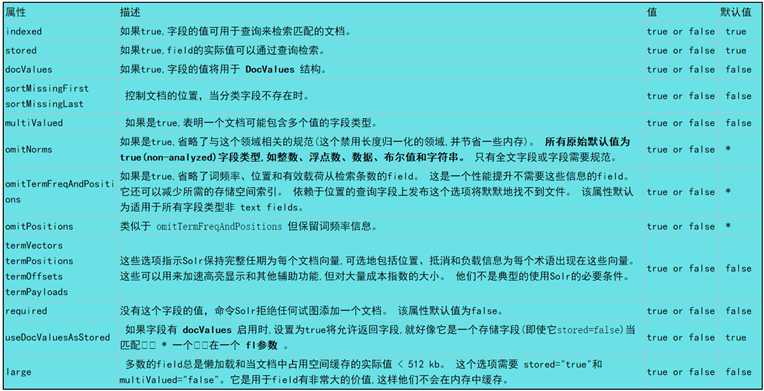
下表列出了在Solr可用字段类型。 的 org.apache.solr.schema 包包括所有表中列出的类。
由于工作原因,下边的描述还有待查证。
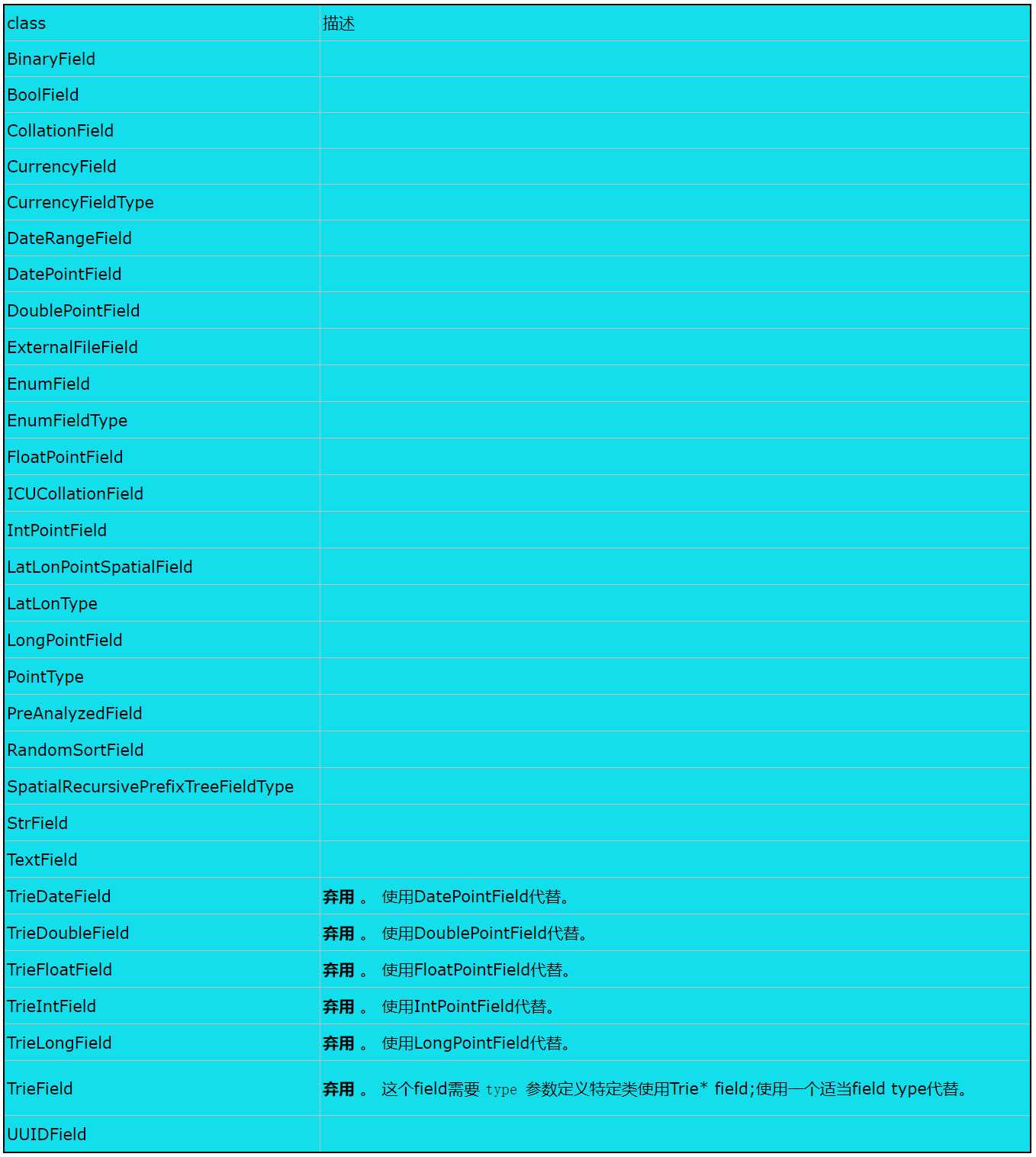
上面的整理来自博文:https://www.cnblogs.com/gaogaoyanjiu/p/7815558.html
它使用的7.1.0版本。在这里感谢博主的分享。
标签:uid ring 划线 .text dso ras XA return ret
原文地址:https://www.cnblogs.com/jepson6669/p/9142676.html